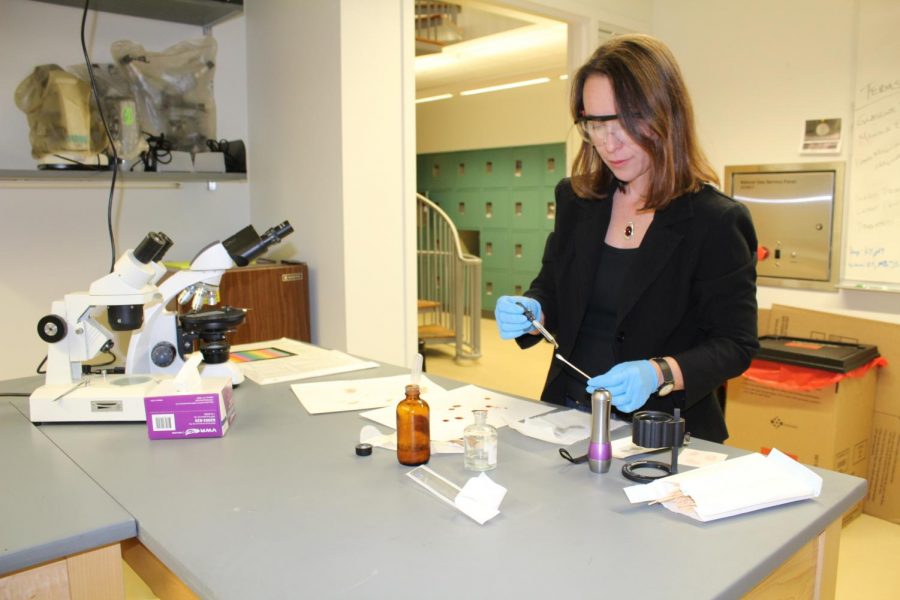Professor’s crime scene experience bleeds out into teaching
Director of Forensic Chemistry Anna Duggar demonstrates a forensic blood spatter examination and analysis. Duggar is a blood spatter analysis expert who worked alongside various police department crime scene labratories and teaches forensic analysis at Loyola.
October 24, 2019
As a young girl growing up in New Orleans, Anna Duggar never expected to find herself in the midst of crime scenes examining trails of blood. Though she had a passion for science at a young age, the idea of blood spatter analysis wasn’t immediately obvious.
Now a forensic scientist and director of Loyola’s Forensic Chemistry program, Duggar specializes in pattern analysis covering fingerprint, footwear and tire track comparison, as well as blood spatter analysis.
As a college student in a time before “NCIS” and “CSI,” Duggar was self inspired when it came to entering the forensic field. She decided to focus her independent project and master thesis on the science of blood spatter after joining the master’s program at John Jay College of Criminal Justice in New York City.
Quickly becoming an expert in the blood spatter field, Duggar began teaching early on as a teacher’s assistant at John Jay College.
“When I TA’ed the 40 hour courses, that was entertaining,” Duggar said. “I was definitely a low man on the totem pole in that crowd and, more importantly, I was probably the smallest in the room.”
It was the work she did as a teacher’s assistant, coupled with her master’s thesis research, that led Duggar to eventually consider herself a blood spatter analysis expert.
Blood spatter analysis isn’t for the faint of heart, however, or anyone afraid of getting a bit messy. Duggar learned this firsthand during her teacher’s assistant experience, when her class asked for a hands-on forensic demonstration.
“One day, the class started talking about how they wanted to see some drag marks and what would it look like when dragging a victim, and so you know, everybody looked at me,” Duggar said. “It started with me in a suit and they poured a big puddle of beef blood on the floor and they had me lie down in the suit and dragged me through it for the drag marks.”
According to Duggar, the suit only obscured the marks the students hoped to analyze, so she committed to getting down and dirty for the sake of science.
“It ended up being me in my workout clothes being dragged through blood, and then at that point, they asked ‘what if we drag you by the feet though?’” Duggar said. “So then they’re pouring blood over my hair and dragging me that way. That’s one of those moments you waddle back to the dorm to wash all the stuff off and you think to yourself, this is not what I thought I’d be doing for my career.”
After coming back to New Orleans, Duggar worked with the New Orleans Police Department’s crime laboratory and began working closely with law enforcement as a forensics analyst. While working with the crime lab, she used her knowledge as an expert in court supporting or disproving witness testimony by looking for records in the blood left behind at crime scenes.
After decades of work, Duggar says that being a forensic scientist is an intrinsic part of her identity.
But, while she loves her work, Duggar says there is often an incorrect perception of what she does due to what she calls the “CSI effect.”
“There is certainly a lot of interest regarding blood spatter and a lot of people, when you say you’re a forensic scientist, they say right away ‘Wow, that’s really exciting,'” Duggar said. “On the one hand, you love that because you want people to be excited about what you do, and at the same time … I tend to respond with ‘it’s really exciting when it’s really exciting, and when it’s not it’s really tedious.'”
It was 2004 when Duggar joined the “remarkable community” at Loyola to teach forensics. In the crime scene course she teaches, students learn to analyze blood spatter and pattern analysis. She said many students don’t realize how challenging the course is until it comes down to the tedious details of the work.
For Duggar, balancing a career teaching with her experience in the field of crime scenes is a dream come true.
“I’ve always loved science and I’ve always loved law enforcement and to be able to do something that is both, that was and is a dream come true,” Duggar said. “I get to be able to educate people about it on top of that, I mean that’s a trifecta.”








